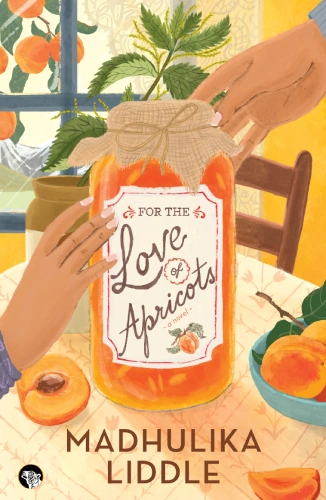
Nandini knew next to nothing about children. Especially ones as small as this. She did not mind playing with the older of the village children, but infants seemed so awfully fragile: even though she never said so, she quaked every time a doting mother handed her a baby to hold. Now she felt utterly helpless, and Shalu did not seem to be making much headway in quietening her baby. His cries rang out across the mountainside even as his mother rubbed his back, cooed to him, patted him, and made much of him.
‘What’s wrong?’ said a man’s voice.
Nandini whirled around, surprised. The man must have come up the path leading out of Negi Sahib’s orchard, his footsteps quiet on the path—in any case, what with the racket Munnu was making, you probably wouldn’t have heard a herd of cows coming that way. This man wore sneakers, proper Adidas ones, not local copies that would break in a few months’ time. He wore jeans and a sweater that, though it had obviously seen better days, was just as obviously of good quality. A man not from these parts, a city man. An educated man. His rumpled hair had a sprinkle of grey in it, even though his face looked relatively young, almost incongruously boyish. This must be the man Shalu had mentioned as having bought Negi Sahib’s orchard—what was his name? Nandini wracked her brains but could not remember.
‘He won’t stop crying,’ Nandini said in Hindi, since that was the language he had used, and since Shalu knew no English.
‘I can see that,’ the man said, giving her a somewhat impatient look. ‘Why?’
‘If we knew why, we’d have done something about it, wouldn’t we?’ Nandini snapped back. The man opened his mouth to say something, but before he could utter more than a ‘Why don’t you’ Munnu had let out another ear-splitting yell that made the man wince.
Shalu, looking up shamefacedly at both of them, especially at the man, went on mumbling soothing gibberish to Munnu, and waved her hand. Waved them away, very definitely and very undoubtedly.
‘You want us to go?’ Nandini asked when there was a brief lull, a moment later, in Munnu’s wails. The man, she noticed from the corner of her eye, was already in swift retreat: another few seconds, and he would have disappeared from sight.
‘Yes, yes, please. Maybe he’s hungry.’ Shalu was already shifting about on the rock, turning her back to the road, pulling out a shawl from the big bag that Nandini had been carrying all this way up for her.
‘Do you want me to get out something from the bag?’ Nandini asked, remembering the many odds and ends she had seen peeping out from it: fruit, a packet of biscuits, little closed steel dabbas full of khichri and halwa and who knew what. Diapers made of old cloth. Towels.
Shalu was already drawing the shawl around herself and a still wailing Munnu, covering them up, not just to protect her child from the wind, which they now faced, but to protect herself too from any sudden passerby who may chance upon this mother breastfeeding her child on the hillside. ‘No.’ Then, as an afterthought, ‘If Bhaiya has it, can you get some fennel seeds? Pounded lightly, if possible.’
Nandini nodded, then realizing that Shalu could not see her any longer, she said, ‘All right. I’ll see.’
She did not like the idea of going up to the man’s house. If he had been there when Shalu had given that instruction about the fennel seeds, it would have been a different matter. Now she would be obliged to go up to his home and tell him that she was here on an errand for which she had no proof. There had been something disapproving about him, as if he did not like her. A vibe. She found him brusque, and brusque people put her off. Besides, she didn’t like barging into people’s houses. Not to ask for fennel seeds, or—worse—to pound them.
She had no wish to face him, but she would have to, for Shalu’s sake, and Munnu’s. She heaved a sigh of resignation and lifted the latch on the gate.
Excerpted with permission from the publisher.
Publisher: Speaking Tiger
Madhulika Liddle is a novelist and award-winning short story writer. She is best-known as the author of the Muzaffar Jang series, about a seventeenth-century Mughal detective. Her latest novel, An Unholy Drought is part of a four-novel series—The Delhi Quartet—that will span eight hundred years of Delhi’s history, beginning with the establishment of the Delhi Sultanate and ending with Partition. The first novel in the series, The Garden of Heaven, was published in 2021.
Subscribe to our newsletter To Recieve Updates
Join our newsletter to receive updates